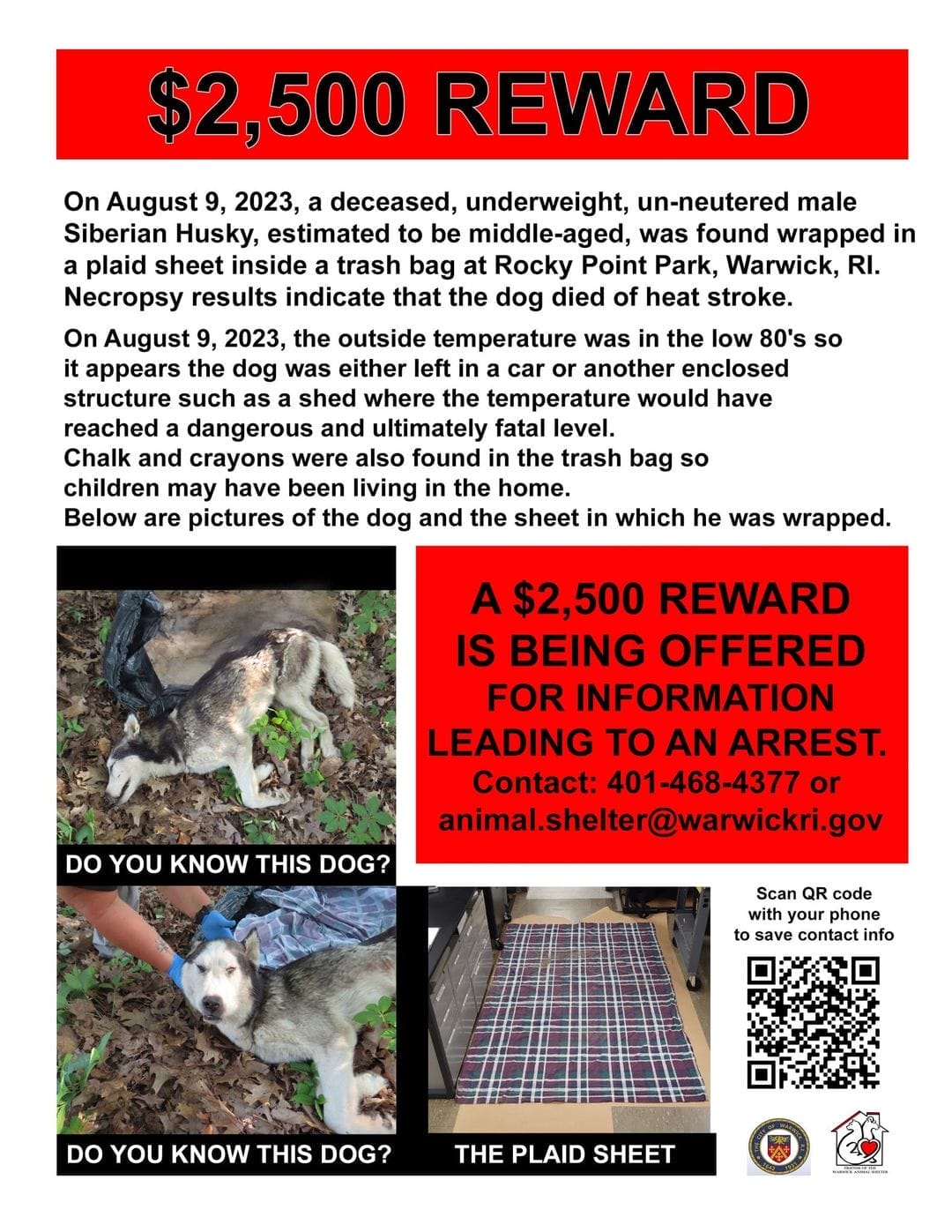![[CREDIT: WPD, Warwick Animal Shelter] Above, left, a dead Siberian Husky left at Rocky Point Park Aug. 9 and at right, a Labrador abandoned at Pawtuxet Cemetery, later euthanized. The dogs are prominent examples of a larger problem of mounting pet suffering - a growing abandoned and mistreated dogs and cats.](https://e8dgfhu6pow.exactdn.com/wp-content/uploads/2024/02/Warwick-Animal-Shelter-Mounting-Pet-Suffering-copy.jpg?strip=all&lossy=1&ssl=1)
![[CREDIT: WPD, Warwick Animal Shelter] Above, left, a dead Siberian Husky left at Rocky Point Park Aug. 9 and at right, a Labrador abandoned at Pawtuxet Cemetery, later euthanized. The dogs are prominent examples of a larger problem of mounting pet suffering - a growing abandoned and mistreated dogs and cats.](https://e8dgfhu6pow.exactdn.com/wp-content/uploads/2024/02/Mounting-Pet-Suffering.jpg?strip=all&lossy=1&ssl=1)

WARWICK, RI — A Husky, dead of heat stroke, in Rocky Point Park. An emaciated Labrador left at Pawtuxet Cemetery. Recent examples of mounting pet suffering in Rhode Island, the result of irresponsible owners, pandemic pressures and imported dogs, are preventable, a local official says.
A few weeks ago, the Warwick Animal Shelter, seeking leads in the case of the dead, underweight, un-neutered Husky, found wrapped in a plaid sheet inside a trash bag with chalk and crayons Aug. 9, posted a $2,500 reward for information in the case.
In December, Warwick Police asked the public’s help finding the persons responsible for an older abandoned dog at Pawtuxet Cemetery Sunday, Nov. 19. The emaciated dog, suffering from other health problems, had to be euthanized.
The illegal incidents – it’s unlawful to abandon dogs or to dispose of dead animals in parks – are the result of irresponsible pet owners, but they are far from the only animals suffering thanks to recent pressures on pet owners, shelters and the state’s domestic animal populations.
Warwick Animal Shelter Director Ann Corvin said within the last few weeks there have been four cases of abandoned animals. She said there’s been a lot more such cases during the last three years, due to a combination of factors.
One of those factors is the pandemic, during which people confined to their homes adopted cats and dogs. With the recent return to on-site work as pandemic restrictions relaxed, a number of people gave up their pets rather than arrange care for them while they were away. Increased numbers of people losing their homes as a moratorium on evictions ended and rent prices rose led to still more people deciding to give up their pets, Corvin aid.
While those are trying circumstances, Corvin said, pet owners giving up pets also give up on their commitment to their animals’ life-long well-being.
“They need to assume more responsibility,” Corvin said. Taking on a pet means accepting responsibility for that animal’s life, for its whole life, and, “Making certain they are able to do that.”
If you do have no other choice, Corvin said, you have to plan well ahead if you want to responsibly leave them at Warwick Animal Shelter, or any Rhode Island shelter, right now. Shelters throughout the state are overworked and fully occupied, she said.
“You’re not going to be able to make a call and drop off a dog that day,” Corvin said. Pet owners need to start working to re-home or shelter their dogs, “as soon as you get an inkling,” that you might need that option, she said. “Not the day before the mover’s coming to take you out.”
Craigslist is also a bad idea for people trying to re-home their dogs, she said. It’s also a bad idea for anyone looking for a pet. Often, once someone has realized there is a problem with a new pet, they’re not able to locate the person who gave it to them again. And there’s no vetting for people taking dogs or cats off your hands on Craigslist, either.
But the demand for relinquishing pets isn’t slowing down.
“On a Monday, it’s not unusual for us to get five calls for people who want to abandon their animals,” Corvin said.
Mounting pet suffering: A multi-pronged problem
Corvin said the last three years have been especially tough for shelter staff and for the rising numbers of abandoned or relinquished pets. Prior to 2020, she said, the state’s homeless and stray pet population was manageable, due to a number of neuter and spay laws and programs in the Ocean State, enacted over the last several years.
“I think the pandemic definitely played a role in it,” Corvin said. People took advantage of the extra time at home to welcome pets into their lives, and in many cases, when circumstances changed, many chose to navigate the new situations without their pets.
Also, during the pandemic, “Evictions were suspended during that time, and now they’re not,” Corvin said. People returned to workplaces, lost jobs, or lost their homes, and their pets were often not part of the plan while dealing with those changes.
Another big part of the problem is dogs shipped from southern states to Rhode Island, worsening the situation. Rhode Island had long benefited from spay and neuter laws and programs that kept the number of stray and unwanted dogs and cats from getting out of control. Many southern states lack those protections, and as a result, there are a lot of animals in that part of the country that need help. The problem is, Corvin said, Rhode Island can only handle so many animals in the shelter system.
The issue is also a concern with cats, as noted by Scruffy Paws Animal Rescue of Warwick, which handles cat rescues.
![[CREDIT: WPD] Warwick Police are asking the public for help investigating a senior dog abandoned at Pawtuxet Cemetery this weekend. The dog was euthanized due to its poor health.](https://e8dgfhu6pow.exactdn.com/wp-content/uploads/2023/12/WPD-Animal-Abuse-Abandoned-Dog-Pawtuxet-Cemetery.jpg?strip=all&lossy=1&ssl=1)
This is a test
